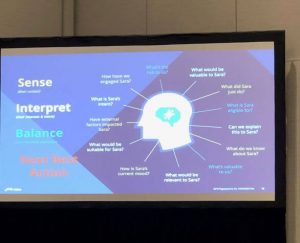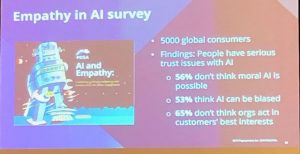
As we enter the Human Machine Age, there is continued concern about what that means to humans. Questions like how will it change the way we work, the way we communicate, the way we shop; and these are just a few of the questions that are running through the minds of people. From AI assistants on our mobile devices to machine learning providing us buying recommendations to almost daily conversations with chatbots, AI has come into our world and it is here to stay. However, the impact on people is still very much in the balance; and I believe it is time for more companies to step up their commitment to ethical AI and building bridges between Humans and Machines.
Last week I attended Pegaworld 2019 in Las Vegas, Pega’s annual user and partner conference. Spending two and a half days with the company, speaking with executive leaders, partners, and customers, I was listening for key themes coming out of the Boston based company.
Straight away, one thing caught my eye. As a purveyor of data privacy and ethical AI, I’m looking for company’s that are willing to put the human in human/machine first, and this was the key message of Pegaworld 2019 as the company introduced their new customer engagement solutions which they deemed as “Empathetic AI.” (Note: I say empathic, but the two words are interchangeable). The idea is that with the data that company’s like banks, insurers, healthcare companies and retailers have at their disposal, isn’t there a way to make sure that the way AI and Analytics are used to engage are better than what we have now? Sure we have AI tools and Analytics tools running in the wild, but can they be more human? Pega thought so and this is where they are focusing on Next Best Action or “NBA” as they like to call it.

Using the available data from disparate systems, Pega Customer Engagement solutions are able to Sense, Interpret and Balance, context, interest/intent and business interests respectively. Per the graphic below, you can see how this asks very human questions of the available data to better understand how a company may have engaged a customer, what the customer’s intent is and even things like mood and relevance. This is powerful, because this goes beyond looking at things like click patterns to truly understand why a customer is taking an action. A good example of this is a customer looking to refinance a home. This leads to so many questions that need to be answered before an offer or suggested action can be given. Everything from why they are looking to timing to potential distress or new risk factors. Most systems will only look at the actions such as clicking on mortgage options and then they will bombard with offers; often time not relevant. Is the user even looking for a mortgage refinance for them? Maybe first the system should make sure they have a current mortgage. These kinds of links can be identified in all sorts of industries, and all can be improved when AI uses empathy to drive the next best action.
In a recent Pega-led survey on AI and Empathy, the company talked to 5,000 global consumers. They found that people have a serious trust issue with AI. 56 percent don’t believe AI is moral, 53 percent believe it is bias and 65 percent don’t think organizations act in the customers best interest to begin with. This all adds up to a need for better use of data, systems and software to drive trust. While the use of data and origin will continue to bring new challenges (compliance and GDPR), perhaps more companies using the data better with the customer truly being first could instill greater levels of trust by customers. I certainly see how this could be the case.

There is no question that the future will continue to see proliferation of AI. It isn’t just because automation, machine and deep learning and AI Algorithms help us do more with data. It is because our lives can be better when AI is inserted into the process. Our life experiences, from travel to shopping to eating out can all be a little better when the vast data we generate and share is utilized to help companies present us with more personalized and meaningful experiences. However, as I suggested, this needs to be done with balance. We need to reduce the creepy factor, increase transparency and get back to thinking about the “Human” behind all of this technology. Pegaworld 2019 was an encouraging event as the company leans into empathic AI. I believe they are showing, not telling, a compelling story of how data, next best actions and AI can be built with the people in mind. A great start for an important conversation, one that I’m glad to see a company like Pega bringing it to the forefront.
Related reads:
Robotic Process Automation Gaining Traction
Finding and Targeting the Right Customer with AI
The original version of this article was first published on Futurum Research.
Daniel Newman is the Principal Analyst of Futurum Research and the CEO of Broadsuite Media Group. Living his life at the intersection of people and technology, Daniel works with the world’s largest technology brands exploring Digital Transformation and how it is influencing the enterprise. From Big Data to IoT to Cloud Computing, Newman makes the connections between business, people and tech that are required for companies to benefit most from their technology projects, which leads to his ideas regularly being cited in CIO.Com, CIO Review and hundreds of other sites across the world. A 5x Best Selling Author including his most recent “Building Dragons: Digital Transformation in the Experience Economy,” Daniel is also a Forbes, Entrepreneur and Huffington Post Contributor. MBA and Graduate Adjunct Professor, Daniel Newman is a Chicago Native and his speaking takes him around the world each year as he shares his vision of the role technology will play in our future.

